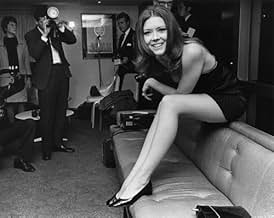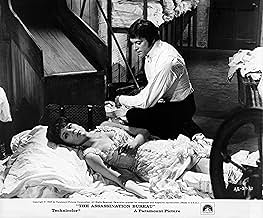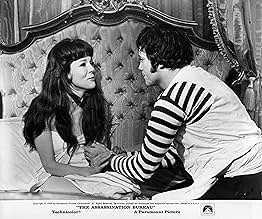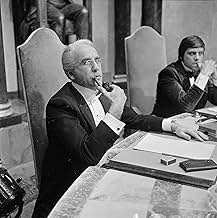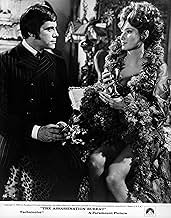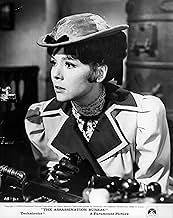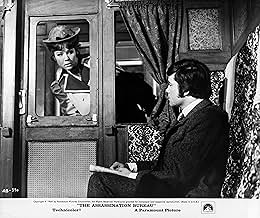AVALIAÇÃO DA IMDb
6,4/10
3,9 mil
SUA AVALIAÇÃO
Oliver Reed e Diana Rigg comandam um impecável elenco em The Assassination Bureau, uma série espirituosa inspirada por um livro de coautoria de Jack London.Oliver Reed e Diana Rigg comandam um impecável elenco em The Assassination Bureau, uma série espirituosa inspirada por um livro de coautoria de Jack London.Oliver Reed e Diana Rigg comandam um impecável elenco em The Assassination Bureau, uma série espirituosa inspirada por um livro de coautoria de Jack London.
- Direção
- Roteiristas
- Artistas
- Prêmios
- 2 indicações no total
Curd Jürgens
- Gen. von Pinck
- (as Curt Jurgens)
John Abineri
- Police Inspector
- (não creditado)
John Adams
- French President
- (não creditado)
Jonathan Adams
- French President
- (não creditado)
Avaliações em destaque
If the awestruck viewer of this lovely, spacious-looking and delightful satire can get past the multiple locales, the elaborate and often-sumptuous style and the sheer colorfulness of the goings-on, there is a solid and interesting plot line under propping the entire gorgeous edifice. Behind the overwhelming "stylishness" that first greets the eyes, and it is a wonderfully varied and colorful production, Jack London's fascinating story of the "assassination bureau" has been updated by writer Robert L. Fish to be an "ethical" idea gone wrong. The basic premise is that the pragmatic and cynical end of the 19th Century with its pseudo-Christian thug-like monarchs, dynasts and empire-builders was unjust to individual victims. because this situation led some to wish the worst offenders removed from their tyrannies and interferences, Ivan Dragomilov's father created the Assassination Baureau, Ltd. However, an instrument designed to remove the worst offending baddies from an imperfect world has now become a murder-for-hire problem. Enter Diana Rigg, who finds out how to hire the Bureau to take a contract on--Ivan Dragomilov, played intelligently by Oliver reed. He accepts the contract, recognizing what his father's "noble instrument" has been allowed to become. The remainder of the film's scenes then feature a long and fascinatingly funny duel between Rigg and Oliver and the bureau's chiefs, against whom Reed has declared war. These stalwarts include stalwarts such as the great Curt Jurgens in Germany, Cilve Revill in Italy, Telly Savals in London and others in Paris and elsewhere. Sweeping scenes such as the French bordello scenes, the German Restaurant duel, the hilarious Italian caper, the flaming-lighter escape on the train trick and others lead to the climactic race to save London from Savalas's explosive plot. The lovely mounting of the production is highlighted by Basil Dearden's wonderful ability with actors, blocking, and camera-work, Art Director Michael Relph's award-level contributions, magnificent costumes luminous lighting and many other achievements. Many other actors including Beryl Reed, Philippe Noiret and pretty Annabella Incontrera contributed; Ron Grainer's music is a great asset also. But I believe what sets this satirical thriller apart is its realistic ethical dimension; the fact that the Age of Empire was an age of evil governments and unethical pretensions by state tsars has not even now been recognized. This long and intensely-diverting film is a beautiful-polished needle that pricks a much-needed hole in the gasbag of public-interest-tyranny's post modernistic pretensions. It is a film that deserves to be laughed with, applauded and considered carefully for its positive sense-of-life and all-around sparkling wit, dialogue and spirit of adventurous fun.
Back in the mid-'60s, Diana Rigg was probably responsible for jump-starting the puberties of millions of baby boomer boys, thanks to her portrayal of Emma Peel in the hit BBC program "The Avengers." At any rate, along with Anne Francis' turn on "Honey West" and just about every woman in the first five Bond movies, she was certainly responsible for jump-starting mine, and I love watching her in anything she does even today, almost 40 years later. (Seeing her "Medea" on Broadway in 1994 was especially satisfying.) In "The Assassination Bureau" (1969), Diana plays a British (natch) freelance reporter in turn-of-the-century London who infiltrates Oliver Reed's titular organization (a sort of political Murder Inc.) and hires him to put a hit on...himself! Thus starts a series of wild and woolly escapades, as Reed races all over Europe trying to kill his organization's principals, before they can do away with him. We get tongue-in-cheek episodes (filmed all over Europe, and with lavish production values) involving a Parisian brothel, a Swiss bank, the beer halls of Vienna and the canals of Venice, all culminating in a fierce, exciting battle on an airborne, primitive zeppelin, with the fate of the Continent hanging in the balance. The film moves along very briskly and is quite entertaining, and Curt Jergens and Telly Savalas (who starred with Rigg that same year in "On Her Majesty's Secret Service") add delicious supporting performances. Diana, need I say, looks absolutely gorgeous, especially when shown in those frilly undergarment and bathtub scenes. Featuring a literate, witty script and consistently amusing and inventive situations, "The Assassination Bureau" is a real treat indeed. And Diana Rigg's exquisite presence is the yummy icing on an already tasty cake.
Jack London was a phenomenal writer, who came up from poverty and turned out some amazing books. These include (but are not limited to) THE SEA WOLF, WHITE FANG, THE CALL OF THE WILD. London is usually brushed aside today as a "kids" author. The same idiocy that relegates Jules Verne to be a writer for children and ignores his savage comments on politics affects London. After you are encouraged (about eighth grade) to read THE CALL OF THE WILD, you are told that London is always writing about man and animals in Alaska in the Gold Rush of 1898, with an occasional look at an exciting sea story.
Actually he's sharper than that: THE CALL OF THE WILD and WHITE FANG were his attempts to tell a story from an animals' point of view. THE SEA WOLF is his attempt to attack the prevalent socio-economic doctrine of the day (1900): Social Darwinism, as practiced by Captain Wolf Larsen. He wrote one of the first good novels about America under a dictatorship: THE IRON HEEL. He discussed his early life in MARTIN EDEN. He discussed his alcoholism in his book JOHN BARLEYCORN. He was the first American novelist of real international stature to embrace socialism! A reporter as well as writer, his experiences watching the Japanese government prevent him from carrying out his job during the Russo - Japanese War turned him into a perpetually hostile critic of Japan's goals in the Pacific (although, to be fair to the Japanese, London did show some racism here).
Keeping this in mind, one realizes that THE ASSASSINATION BUREAU, LTD. has to be tackled differently from say THE CALL OF THE WILD or the short story TO BUILD A FIRE. London is looking with jaundice eye at the political system that had ruled Europe (and most of the world) since 1815 or so. It was oppressive and uneven, and even in the United States (probably the best major power to live in in terms of opportunity and social mobility) it was still badly flawed.
Assassination had become a serious tool for trying to influence European affairs from 1881 to 1910 (when the novel was begun by London). Tsar Alexander II of Russia was blown to bits in 1881 by a Nihilist group called "The People's Will". Although it was captured and most of its members hanged, others copied it. Assassinations continued in Russia up to 1911 including Interior Grand Duke Serge in 1904,Minister Von Phleve in 1905, and Prime Minister Peter Stolypin in 1911. Elsewhere the other states suffered. Presidents Garfield and McKinley were assassinated in 1881 and 1901 (the latter by a self-proclaimed anarchist). President Sadi Carnot of France was stabbed to death in a public parade in 1894, in the middle of a series of anarchist attacks (including a bombing at the Chambre of Deputies). Empress Elisabeth of Austria-Hungary, King Umberto I of Italy, the Prime Minister of Spain, King Carlos III of Portugal, were all killed. So were Lord Frederick Cavendish and Thomas Burke by Irish nationalists in Phoenix Park in 1882. Many smaller public figures were killed as well. The topic of an "assassination bureau" was timely - especially as some of these victims fit what the bureau decided: were the targets worthy of being assassinated.
Of course not all of them were (Empress Elisabeth for example). But London's vision was not totally flawed. It was just that being a realist he knew that the "pure" idea of the bureau would be corrupted sooner or later. So his plot involves the head of this international bureau being offered a huge reward if he orders his own assassination. Note that Oliver Reed's character is a Russian, as though the author knew who was most likely to be the head of an assassination group.
Probably due to other commitments London never finished the novel. Robert L. Fish, a successful mystery novelist, wrote a completion which was rather amusing. I tend to believe that was an error - London was seldom an amusing writer. The film treats the moral issue as a joke, and uses the characters as caricatures of the nations they represent (the doleful Russian, the gluttonous and sexually active Italian, the pragmatic Frenchmen who runs a bordello too, the English newspaper tycoon). These characters need good performers, and Philippe Noiret is on target as the bordello owner/assassin leader); and (although not Italian) Clive Revill is quite good as the Italian. The Russian (it's not Reed) is doleful, but hardly memorable. As for Lord Bostwick, Telly Savalas is not convincing as an English aristocrat (one can't even imagine him as a Canadian transplant to England, like Spencer Tracy in EDWARD, MY SON). Curt Jurgens' German assassination leader, General Von Pinck (the name suggested, perhaps, by his handiness with a sword) is either sadistically high-spirited or vicious: no other characteristics there.
Diana Rigg, as the budding journalist who's first job is actually as a cats-paw for Savalas (her boss) is pretty good, but her performance as Vincent Price's daughter in THEATRE OF BLOOD was livelier. She seems determined to maintain her suffragette style dignity here no matter what. However it happens to work for the film. As for Reed, his straight villains were usually far better than his heroes. He appears to be too laid back at times. A bit more jittery behavior would have been better.
One final point: One minor character, an Austrian nobleman marked for death, is killed when he cuts into a large knock-wurst (that has a bomb in it). This gag probably is not original but it was reused in the television movie MORE WILD WILD WEST with Jonathan Winters as the victim.
Actually he's sharper than that: THE CALL OF THE WILD and WHITE FANG were his attempts to tell a story from an animals' point of view. THE SEA WOLF is his attempt to attack the prevalent socio-economic doctrine of the day (1900): Social Darwinism, as practiced by Captain Wolf Larsen. He wrote one of the first good novels about America under a dictatorship: THE IRON HEEL. He discussed his early life in MARTIN EDEN. He discussed his alcoholism in his book JOHN BARLEYCORN. He was the first American novelist of real international stature to embrace socialism! A reporter as well as writer, his experiences watching the Japanese government prevent him from carrying out his job during the Russo - Japanese War turned him into a perpetually hostile critic of Japan's goals in the Pacific (although, to be fair to the Japanese, London did show some racism here).
Keeping this in mind, one realizes that THE ASSASSINATION BUREAU, LTD. has to be tackled differently from say THE CALL OF THE WILD or the short story TO BUILD A FIRE. London is looking with jaundice eye at the political system that had ruled Europe (and most of the world) since 1815 or so. It was oppressive and uneven, and even in the United States (probably the best major power to live in in terms of opportunity and social mobility) it was still badly flawed.
Assassination had become a serious tool for trying to influence European affairs from 1881 to 1910 (when the novel was begun by London). Tsar Alexander II of Russia was blown to bits in 1881 by a Nihilist group called "The People's Will". Although it was captured and most of its members hanged, others copied it. Assassinations continued in Russia up to 1911 including Interior Grand Duke Serge in 1904,Minister Von Phleve in 1905, and Prime Minister Peter Stolypin in 1911. Elsewhere the other states suffered. Presidents Garfield and McKinley were assassinated in 1881 and 1901 (the latter by a self-proclaimed anarchist). President Sadi Carnot of France was stabbed to death in a public parade in 1894, in the middle of a series of anarchist attacks (including a bombing at the Chambre of Deputies). Empress Elisabeth of Austria-Hungary, King Umberto I of Italy, the Prime Minister of Spain, King Carlos III of Portugal, were all killed. So were Lord Frederick Cavendish and Thomas Burke by Irish nationalists in Phoenix Park in 1882. Many smaller public figures were killed as well. The topic of an "assassination bureau" was timely - especially as some of these victims fit what the bureau decided: were the targets worthy of being assassinated.
Of course not all of them were (Empress Elisabeth for example). But London's vision was not totally flawed. It was just that being a realist he knew that the "pure" idea of the bureau would be corrupted sooner or later. So his plot involves the head of this international bureau being offered a huge reward if he orders his own assassination. Note that Oliver Reed's character is a Russian, as though the author knew who was most likely to be the head of an assassination group.
Probably due to other commitments London never finished the novel. Robert L. Fish, a successful mystery novelist, wrote a completion which was rather amusing. I tend to believe that was an error - London was seldom an amusing writer. The film treats the moral issue as a joke, and uses the characters as caricatures of the nations they represent (the doleful Russian, the gluttonous and sexually active Italian, the pragmatic Frenchmen who runs a bordello too, the English newspaper tycoon). These characters need good performers, and Philippe Noiret is on target as the bordello owner/assassin leader); and (although not Italian) Clive Revill is quite good as the Italian. The Russian (it's not Reed) is doleful, but hardly memorable. As for Lord Bostwick, Telly Savalas is not convincing as an English aristocrat (one can't even imagine him as a Canadian transplant to England, like Spencer Tracy in EDWARD, MY SON). Curt Jurgens' German assassination leader, General Von Pinck (the name suggested, perhaps, by his handiness with a sword) is either sadistically high-spirited or vicious: no other characteristics there.
Diana Rigg, as the budding journalist who's first job is actually as a cats-paw for Savalas (her boss) is pretty good, but her performance as Vincent Price's daughter in THEATRE OF BLOOD was livelier. She seems determined to maintain her suffragette style dignity here no matter what. However it happens to work for the film. As for Reed, his straight villains were usually far better than his heroes. He appears to be too laid back at times. A bit more jittery behavior would have been better.
One final point: One minor character, an Austrian nobleman marked for death, is killed when he cuts into a large knock-wurst (that has a bomb in it). This gag probably is not original but it was reused in the television movie MORE WILD WILD WEST with Jonathan Winters as the victim.
This film is an enjoyable enough lightweight romp, with an array of locations and actors that is perhaps excessive.
Oliver Reed is suavely bucaneering as the main protaganist, while the other main star, Diana Rigg of Avengers fame, does a very well-judged comic performance as the feminist journalist in 1910. It's a shame she didn't appear in more films. No other actors get much of a chance to shine, as there are far too many minor characters.
The writing is OK; you get the feeling that there should be more laughs than there are. Still, it's an enjoyable enough way to spend an hour and a half.
Rating:- *** (out of *****)
Oliver Reed is suavely bucaneering as the main protaganist, while the other main star, Diana Rigg of Avengers fame, does a very well-judged comic performance as the feminist journalist in 1910. It's a shame she didn't appear in more films. No other actors get much of a chance to shine, as there are far too many minor characters.
The writing is OK; you get the feeling that there should be more laughs than there are. Still, it's an enjoyable enough way to spend an hour and a half.
Rating:- *** (out of *****)
After reading the other comments here, I wonder if these folks saw the same movie. This film is a lot of fun, a touch on the slap-stick side and it isn't supposed to be Bond OR the Pink Panther. Maybe the problem is generational??? Those of us who grew up in the far away and ancient times learned that there didn't have to be an action sequence every thirty seconds, lots of overt sex and toilet humor. These things are what seem to "make" a movie today and it's why a lot of people of my generation a) don't go to a lot of films today and b) really worry about the ones who think the named qualities are what make a movie "good". Oh, well. Every generation has to grow up. When they do, maybe they will find that The Assassination Bureau really is the laugh riot while The American Pies and What About Marys are noted to be rather--well--gross.
Você sabia?
- CuriosidadesJack London's original novel was left markedly incomplete at the time of his death, and it was not until many decades later that the thriller-writer Robert L. Fish (also known as Robert L. Pike) finished it for publication, amidst much publicity. The novel is noticeably more serious in tone than this movie, although a New York Times review at the time called it "delightfully ridiculous."
- Erros de gravaçãoIn the scene about 40-45 minutes in where Lord Bostwick visits General Van Pinck whilst the latter is at fencing practice, there's a map of Europe on the wall. Although this film ostensibly takes place before World War I, the map is of post-Versailles Europe, c.1925-1939.
- Citações
Miss Winter: With your ideas, I'm surprised you're shocked at the thought of war.
Ivan Dragomiloff: Not at all. It's purely a matter of business. How can we charge our sort of prices with everybody happily killing each other for a shilling a day?
Principais escolhas
Faça login para avaliar e ver a lista de recomendações personalizadas
- How long is The Assassination Bureau?Fornecido pela Alexa
Detalhes
- Data de lançamento
- País de origem
- Idiomas
- Também conhecido como
- Sindicato do Crime
- Locações de filme
- Zurique, Cantão de Zurique, Suíça(reconstructed in studio set)
- Empresa de produção
- Consulte mais créditos da empresa na IMDbPro
- Tempo de duração
- 1 h 50 min(110 min)
- Mixagem de som
- Proporção
- 1.85 : 1
Contribua para esta página
Sugerir uma alteração ou adicionar conteúdo ausente

